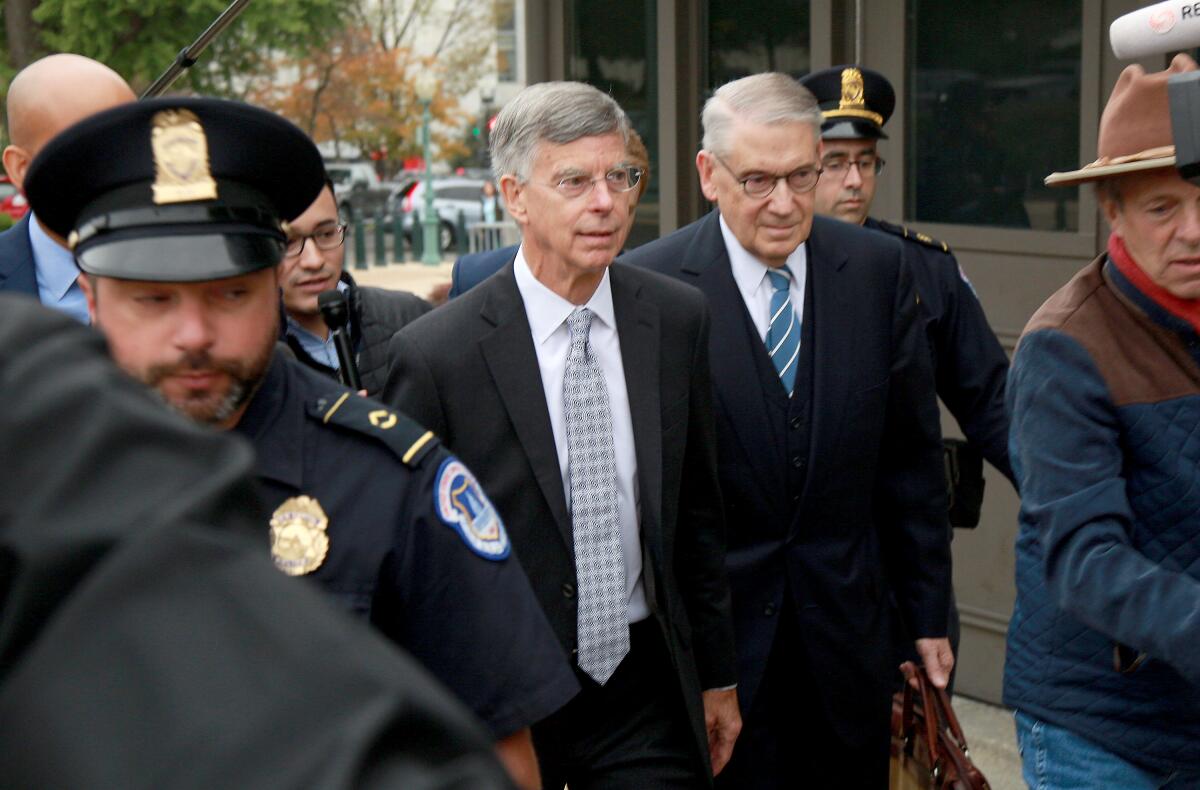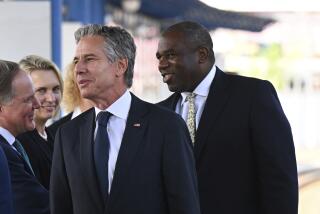Top Ukraine diplomat Bill Taylor threatened to quit over ‘nightmare’ Trump demand, transcript shows

WASHINGTON — William B. Taylor Jr., the top U.S. official in Ukraine and a key witness in the impeachment inquiry into President Trump, told House investigators about a “nightmare” foreign policy gambit in pursuit of political dirt against Joe Biden that he believed was likely to embolden Russia and how he threatened to resign over it.
House Democrats on Wednesday released a transcript of a closed-door deposition by Taylor, the first witness to provide evidence of a quid pro quo in Trump’s dealings with Ukraine. In his testimony, he recounted for lawmakers last month how Trump empowered his attorney, Rudolph W. Giuliani, to open up an unofficial diplomatic channel with Ukraine.
Taylor described how Trump prevented the release of military aid to Ukraine as he used that back channel to prod the country’s leaders to publicly announce an investigation of Biden, the former vice president and potential 2020 rival to Trump.
Taylor testified that he learned in September from Gordon Sondland, the U.S. ambassador to the European Union, that the aid and a White House visit sought by Ukraine’s new president, Volodymyr Zelensky, were both “dependent” on a public statement about an investigation. He worried that demand could embarrass Ukraine and further embolden Russia, he testified.
“The Russians want to know how much support the Ukrainians are going to get in general, but also what kind of support from the Americans,” Taylor told lawmakers. “So the Russians are loving, would love, the humiliation of Zelensky at the hand of the Americans, and would give the Russians a freer hand, and I would quit.”
Explaining to lawmakers his conversation with Sondland, Taylor said he worried about Ukraine making such a statement to satisfy Trump even without a guarantee that the president would eventually release the aid, which is important to the country’s ability to defend itself against incursions by Russia-backed separatists.
The nightmare, Taylor explained, was that Zelensky would mention Burisma, the natural gas company where Biden’s son Hunter served for five years on the board, “get himself in big trouble in [the U.S.] and probably in his country as well, and the security assistance would not be released.”
Democrats in the room for Taylor’s deposition Oct. 22 said it was remarkably “thorough.” The 324-page transcript reveals the detail with which he described key events.
Not surprising, given how central his testimony is to the case, Taylor is scheduled to be the first witness to testify in a public setting Nov. 13 as the impeachment inquiry emerges from behind closed doors after six weeks of witness interviews.
Taylor’s account has now been corroborated by other officials. Sondland amended his testimony this week after claiming that depositions given by other witnesses, especially Taylor, had “refreshed” his memory about telling an aide to Zelensky that the security assistance wouldn’t be delivered until a public statement was made about an investigation.
Taylor described himself as being “alarmed” upon hearing Sept. 1 from Tim Morrison, a National Security Council official at the time, that the aid was contingent on such a statement.
He was similarly disturbed by a subsequent phone call that day with Sondland, who “told me that President Trump had told him that he wants President Zelensky to state publicly that Ukraine will investigate Burisma and alleged Ukrainian interference in the 2016 U.S. election,” he said.
Sondland had “recognized that he had made a mistake” by informing Ukrainian officials that a White House meeting was contingent on a public statement about investigations from Kyiv, even though that was the case, Taylor said.
“Ambassador Sondland said everything was dependent on such an announcement, including security assistance. He said that President Trump wanted President Zelensky in a box by making public statement [sic] about ordering such investigations,” he testified.
Taylor was explicit on two issues that are central to the investigation — that Trump was demanding an investigation that could have an effect on the 2020 campaign and that the Ukrainians wanted no part of it.
“It was becoming clear to the Ukrainians that, in order to get this meeting that they wanted, they would have to commit to pursuing these investigations,” Taylor testified.
He said that Ukraine’s former finance minister, Oleksandr Danylyuk, “understood — and I’m sure that he briefed President Zelensky, I’m sure they had this conversation” that “opening those investigations, in particular on Burisma, would have involved Ukraine in the 2020 election campaign. He did not want to do that.”
Taylor, who came out of retirement in June to serve as U.S. envoy to Ukraine, will be the first of two witnesses to repeat their private testimony in a public setting when the impeachment inquiry enters a new, more television-friendly phase next week.
Taylor and George Kent, a deputy assistant secretary of State, are scheduled to testify Nov. 13, House Intelligence Committee Chairman Adam B. Schiff (D-Burbank) announced Wednesday.
Former Ambassador to Ukraine Marie Yovanovitch, who was recalled from her post by Trump, is scheduled to testify Nov. 15, also in a public hearing.
Yovanovitch’s initial testimony was released this week.
Schiff, whom Republicans have criticized for presiding over what they claim is a partisan impeachment process, told reporters Wednesday that the public hearings will allow Americans to hear the evidence and “to evaluate the witnesses for themselves, to make their own determinations about the credibility of the witnesses, but also to learn firsthand about the facts of the president’s misconduct.”
Despite the mounting evidence of a quid pro quo, Republicans have continued to defend the president’s actions. In recent days, several GOP senators said that such behavior, however problematic, doesn’t rise to the level of a crime or isn’t an impeachable offense.
On Wednesday, Sen. Lindsey Graham (R-S.C.), the chairman of the Senate Judiciary Committee, offered a new defense, suggesting that the Trump White House was too inept to execute a quid pro quo.
“What I can tell you about the Trump policy toward the Ukraine, it was incoherent, it depends on who you talk to,” Graham told reporters. “They seem to be incapable of forming a quid pro quo.”
Times staff writer Noah Bierman contributed to this report.
More to Read
Get the L.A. Times Politics newsletter
Deeply reported insights into legislation, politics and policy from Sacramento, Washington and beyond. In your inbox three times per week.
You may occasionally receive promotional content from the Los Angeles Times.











